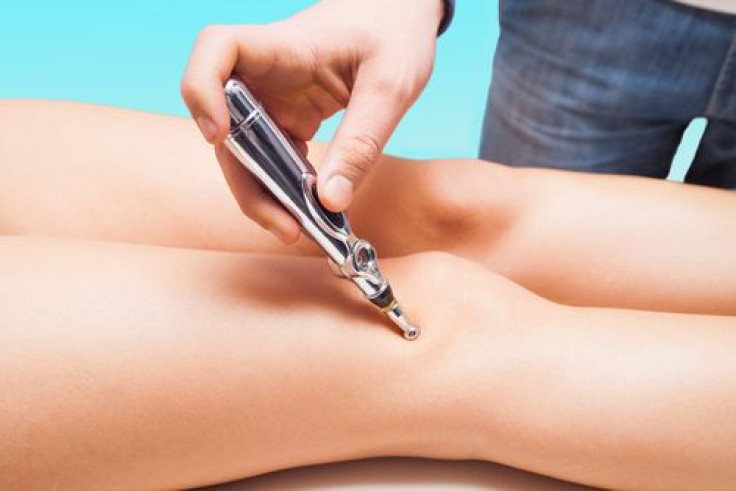Acupuncture May Not Work For People With Chronic Knee Pain Caused By Osteoarthritis

It’s a question on the minds of many 50-somethings, especially those who used to run: how do I put an end to this chronic pain in my knees? While many place their faith in acupuncture, a new study dashes all hope that this popular alternative medicine might provide real relief. Researchers found both needle and laser acupuncture failed to offer greater benefits than sham laser acupuncture treatments for patients with moderate to severe chronic knee pain. "It is possible that longer durations of acupuncture, or ongoing treatment, might help benefits to persist," Dr. Rana S. Hinman, University of Melbourne, Australia, told Medical Daily. "However the benefits we observed compared to no acupuncture were small and unlikely to be clinically meaningful and they were no better than sham treatment. So it is unlikely ongoing treatment would have changed results in our study."
Alternative And Complementary Medicines
When older people talk to their doctors about their aches and pains, the agony they discuss most often is the chronic soreness in their knees. Typically caused by osteoarthritis, knee pain is difficult in itself, yet it also hinders physical activity, a problem for many older adults hoping to exercise. Unfortunately, patients often resort to aspirin and over time either increase the number they take or turn to even stronger drugs. Sometimes patients with joint pain and arthritis try dietary supplements, such as glucosamine and chondroitin sulfate. While researchers in a 2006 large-scale study found glucosamine combined with chondroitin sulfate provided some pain relief for participants with moderate-to-severe pain when compared with a placebo — some patients (though not enough to be scientifically valid) achieved a 20 percent or greater reduction in pain — those with mild (though often chronic) pain did not find relief using glucosamine and chondroitin sulfate either together or separately.
What about acupuncture, the most popular of alternative medical systems – how does that stack up in terms of knee pain relief?
Researchers led by Hinman, enlisted the help of 282 patients, over the age of 50, who experienced chronic knee pain. The study began with the researchers randomly assigning each of the participants to one of four groups: a control group receiving no acupuncture (71 people); a needle acupuncture group (70 people); a laser acupuncture group (71 people); or a sham laser (an inactive laser) acupuncture group (70 people). Over a 12 week period, the treatments were delivered, with neither participants nor the acupuncturists knowing which laser treatments were real and which were sham.
So how did our participants fare? After 12 weeks of treatment, needle and laser acupuncture resulted in “modest improvements” in pain compared with the control group, yet neither treatment improved pain or function more than the sham acupuncture. In other words, sham acupuncture worked as good as the real thing. Unfortunately, the positive results were not maintained for the entire year. In their conclusion, the authors wrote “our findings do not support acupuncture for these patients” — those older than 50 with moderate or severe chronic knee pain.
Cries of disappointment will be heard far and wide with the news of this study, still a few points need be made. "Some individuals achieved greater pain relief than others," Hinman told Medical Daily. The researchers also concede their “findings cannot be generalized to different acupuncture regimens.” That said, there is little evidence to support any theories that different forms of acupuncture treatments — or different practitioners — might improve these results. It is also important to consider that no one in the study suffered any negative side effects. That may be little consolation, but if you think you might be someone who benefits more than most and have the time and money to spend, this study shows that acupuncture can’t hurt you and with adjustments you even might be able to maintain the pain relief.
Source: Hinman RS, McCrory P, Pirotta M, et al. Acupuncture for Chronic Knee Pain A Randomized Clinical Trial. JAMA. 2014.



























